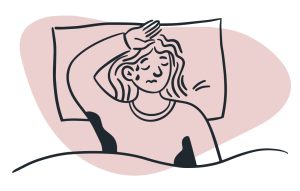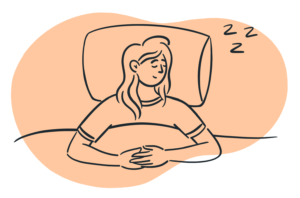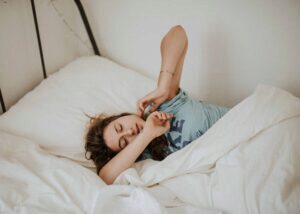Night Sweats: What They Are and How to Find Relief
Disclosure: By clicking on the product links in this article, Mattress Nerd may receive a commission fee at no cost to you, the reader. Read full disclosure statement.
Night sweats is a term describing excessive sweating at night, to the point that your pajamas or bedding become soaked.
Usually, night sweats are related to certain conditions, like menopause, but they can be the result of some illnesses too. It’s an unpleasant symptom, to be sure, but it’s not usually a cause for concern.
Here’s what to know about night sweats, including common causes, how you can manage them at home, and when to see a doctor.
What are Night Sweats?
Night sweats describe extreme perspiration at night, something that can make it really hard to get a good night’s sleep. They’re a repeated occurrence that take place even with appropriate bedding and room temperatures.
So, if you wake up feeling sweaty because you’re bundled up under too many blankets or the temperature in your room is too hot, this isn’t considered night sweats.
Common Causes
Night sweats can be brought on by a number of different reasons.
- Menopause. Hot flashes, sweats, and anxiety are all symptoms of menopause, and they can combine for really disrupted sleep. Fluctuating hormones during this life change can mean you wake up sopping wet in the night and have difficulty falling back to sleep.
- Medications. Some medications, including antidepressants, may cause night sweats. However, there is some dispute about whether it’s the medication itself or the underlying health condition that’s actually triggering the nighttime sweating. Medications like opioids and hormone treatments may also lead to night sweats.
- Illness or infection. Night sweats can be a symptom of infections like tuberculosis and HIV.
- Health conditions including autoimmune diseases, certain types of cancer, and anxiety and depression disorders. A number of clinical conditions are associated with night sweats. In many cases, treating the condition can effectively resolve night sweats.
- Caffeine, alcohol, and tobacco. Caffeine in particular may worsen night sweats caused by menopause. The dilation of blood vessels in the skin that occurs with alcohol use can lead to night sweats. Withdrawal from alcohol can also trigger temporary night sweats as the body recovers.
How to Deal With Night Sweats
Effectively treating night sweats starts with diagnosing their cause. If you’re not sure where to begin, this is a good time to speak with your doctor. They can help you figure out what’s going on and develop a treatment plan designed to meet your needs.
Menopause
If your night sweats are related to menopause, you may find some relief by keeping your bedroom cooler. While optimal sleep temperatures are between 60 and 67 degrees Fahrenheit, body temperatures decrease with age and dialing back the thermostat by a degree or two could help you sleep more comfortably.
Managing stress with activities like yoga to minimize any feelings of anxiety that could be compounding menopausal symptoms may also help reduce hot flashes and night sweats. Cutting back on caffeine and alcohol is another good idea.
Illness & Infection
Night sweats that are a symptom of an infection or illness may be resolved by treating the condition. However, you’ll need to address this directly with your doctor to ensure it’s being treated properly.
Anxiety
Night sweats relating to anxiety or depression disorder will also need to be managed with your doctor’s guidance. You may be prescribed medications or therapy to treat these conditions, which could help resolve nighttime sweating.
Medications
If your night sweats are the result of certain medications, your doctor may be able to prescribe an alternative or adjust your dosage.
Caffeine, alcohol, and tobacco
If you suspect that alcohol, tobacco, or caffeine use is causing or contributing to night sweats, limiting these substances (or avoiding them altogether) could help. If you need support doing so, it can be helpful to speak with a professional.
Popular Sleep Products for Night Sweats
Sleep Number True Temp Sheets
These sheets are made with a special volcanic mineral technology that helps maintain body temperature so you don’t overheat while you sleep. The fabric uses particles that minimize humidity to keep you cool and dry–a great idea if you’re routinely waking up soaked in sweat.
TEMPUR-Cloud Breeze Dual Cooling Pillow
The TEMPUR-Cloud Breeze pillow is made with cooling dual layers of TEMPUR’s proprietary gel foam. While memory foam is traditionally associated with heat retention, these gel-infused layers on both sides of the pillow are designed to be refreshingly cool. It makes for a cool place to rest your head if night sweats are keeping you from a good night’s sleep.
Brooklyn Bedding Gel Swirl Mattress Topper
If a new bed is out of the budget, a cooling mattress topper might be the next best thing. This memory foam topper is swirled with cooling gel to create a temperature neutral sleep surface. It’s an inexpensive, effective way to add cooling features to an existing mattress, especially if you sleep on memory foam, which tends to trap body heat and can exacerbate night sweats.
Parachute Linen Box Quilt
This lightweight quilt is made of linen and cotton, with a polyester batting fill. It’s a soft, airy top layer that won’t trap heat, making it ideal for combating hot, sweaty nights.
Takeaway
Night sweats are often a symptom of another condition, like menopause or anxiety, but they can also be related to certain medications or substances like caffeine or alcohol. Typically, the best way to manage night sweats is to treat the condition that’s causing them, and you may need a doctor to figure that out.
Source List
Johnson A., et al. (2019). Complementary and alternative medicine for menopause. https://journals.sagepub.com/doi/full/10.1177/2515690X19829380
Mold, J. et al. (2012). Night Sweats: A Systematic Review of the Literature. https://www.jabfm.org/content/25/6/878#T4
Mold J. et al. (2015). Selective Serotonin Reuptake Inhibitors and Night Sweats in a Primary Care Population. https://www.ncbi.nlm.nih.gov/pmc/articles/PMC4883206/
Night Sweats. (2022). https://www.mayoclinic.org/symptoms/night-sweats/basics/definition/sym-20050768
Pimenta F. et al. (2011). Perceived Control, Lifestyle, Health, Sociodemographic Factors and Menopause: Impact on Hot Flashes and Night Sweats. https://pubmed.ncbi.nlm.nih.gov/21680119/


